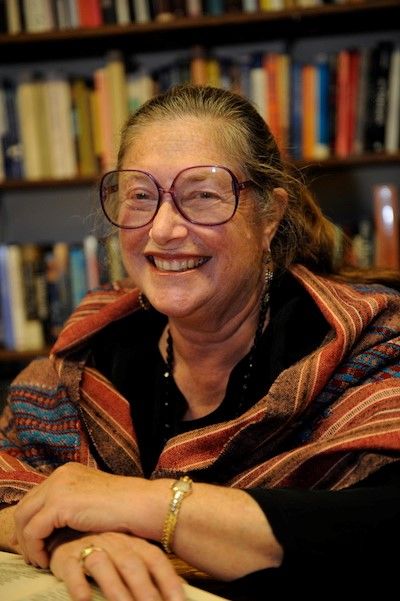
Sunthar Visuvalingam
Israeli Indologist David Shulman gave a well-attended public lecture Nov. 30, in honor of professor Wendy Doniger, the notorious American interpreter of Hindu mythology, at the University of Chicago (UC) Divinity School, before she retires from her long teaching career at the end of this winter quarter.
Under the title “Candrarekha’s Lament: A Not-so-lovely Courtesan, A Bittersweet Poet, and a Very Little King,” Shulman presented this Telugu poem in three cantos by accomplished poet Kuchimanchi Jaggakavi that comically describes the narcissistic infatuation of a petty king for an ugly prostitute. What is most striking about this avidly read poem that had long circulated only in manuscript form is its thoroughly obscene content, often in the coarse language of the gutter that would readily qualify as pornographic were it not for its undeniable literary merits.
The talk consisted in providing necessary context and reading out choice passages in translation to demonstrate its parodying techniques of inversion, wherein her revolting ugliness and his petty self-importance only served to fuel their mutual lust: the sort of material that has been especially worthy of Doniger’s attentions, as Shulman noted.
During this hour-long eulogy, greeted repeatedly by raucous laughter at its lurid intonations, there was no mention of our common knowledge that Doniger is despised by large sections of Hindus, not just religious fundamentalists, to the extent that her book on ‘The Hindus: An Alternative History’ was banned in India. Nor that a growing number of American Indologists and humanities scholars, even (former) UC colleagues, find her work profoundly objectionable.
Public intellectual Rajiv Malhotra has fittingly coined the label ‘Wendy’s Childsyndrome’ for the shared propensity of her PhD students to give free rein, with an exulting in-your-face irreverence, to the most demeaning interpretations of Hinduism.
Doniger attempts to justify her predilections by claiming that her humorless Hindutva detractors have lost the facility with which Hinduism earlier transgressed its own norms.In the 1902 publication of Candrarekha’s Lament, its learned Telugu editor rewrote all the offensive passages to render the poem more palatable to contemporary Indian sensibilities inflected by Victorian puritanism.
He expresses the fervent wish that, with its printing, the unexpurgated manuscripts would gradually disappear from circulation. By thus resurrecting the original within the haloed crowded confines of the UC Divinity School, the ‘first-born child’ seemed to demonstrate that the classical tradition was on his teacher’s side. Starting on his PhD, Shulman began studying with Doniger in 1972 during her stint at SOAS London.
Having already proven his poetic worth through prior works attesting mastery of classical technique, style, and taste, Jagga Kavi was not merely lampooning the inordinate lust of his miserly ‘royal’ patron but parodying the sterile conformity of his mediocre predecessors to stale literary canons.Shulman, however, balked at reducing Kavi’s rhetoric to the procedures of “inversion” (of professed ideals) that define irony and satire. Instead, he coined the term “supraversion” to propose that through incongruous juxtaposition tothe sublime, the obscene has been transvalued into an even higher and innovative level of artistic expression.
I would add that this underlying principle was already enshrined in the earlier tradition of the ‘great brahmin’ clown of the Sanskrit theater, who was obliged to mouth profanities in the vernacular that were not only labeled ‘poetic humor’ but accorded a sacred status beside the king.
Whereas Doniger’s interpretive methods and predilections have been sharply critiqued even by fellow Western scholars in Indology and religious studies, the choice of Shulman to confer this ultimate honor would seem to vindicate (the portrayal of Hinduism in) her life work. For he was the second holder of the prestigious UC Vivekananda Chair that the Indian government had generously funded with US$1.5M in taxpayer money.
In December 2017, he was conferred the International Award “for promoting Indian culture” by the Kanchi Shankaracharya. Emerging from UC Swift Hall, a retired Indian psychiatrist praised to me in Hindi the “excellence” (kamaal) of his talk. Keen to promote collaborations at academic institutions in India, a visiting Hindu research scientist, who seemed to have slept through most of the peroration, joined the following reception to exchange pleasantries with Doniger and Shulman.
Shulman concluded by offering (his exposition of) Candrarekha’s Lament as “a very small guru-dakshina, a gift, to my teacher Wendy, by far the most generous human being I have met.”
It seems to me that to be generous in the exercise of an intellectual discipline that claims to interpret alien peoples is, above all, to attempt to understand them through their own values and thought-categories, exemplified in the pioneering representations of ‘primitive’ cultures by anthropologist Claude Lévi-Strauss, whom Doniger invoked long ago as the primary inspiration for her doctoral thesis. Without such scholarly empathy, abundantly displayed by her senior retired UC colleague and fellow Indologist, McKim Marriott, we are left witnessing the mutual backscratching through which dubious academics promote their own careers.






